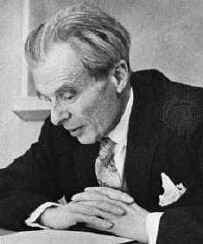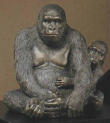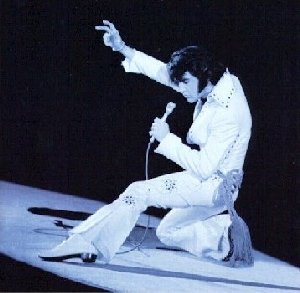Aldous Huxley - A Life
By Our Own
Correspondent
Of course, modern times
put quite a spring into Huxley's step, but the good times seemed to have taken
a hold. Word had spread about his late night scrabble sessions, while his
performance piece "Bring a Rhinoceros" shocked and stunned an apoplectic art
world. It was, however, his New Hampshire parties which brought him infamy
- in particular his 24-hour 'happening', "choose your coconuts, hi", which
led him to an unwanted encounter with the police, although, sporting a black
eye, he later joked with reporters that "you should see the other fellow,
ha ha". His retirement from public
life has been expected for some time; he finished a poor fifth in last year's
Grand National ("Next year I'll use a horse", he quipped) failed to win his
final attempt at the Ryder Cup, and his last novel 'Noddy in Tehran' was kept
from the number one best-sellers position by Anna Ryder Richardson's "Butt
Naked with Lord Lucan". Telling a sorry public the regrettable news, an unbowed
Huxley said, "I've been old and young, big and, yes, even small; I've given
both good and bad; it has all been in public. From now on, your Holiness,
it must all be in private". Huxley is survived by the present English population.
He will be missed. International
figure, raconteur and Northern Territories 'Memory Man' finalist five years
running, Aldous Huxley has shocked his world-wide following by retiring from
public life. For many, the loss has been almost unbearable; his Swedish fan
club has threatened shock tactics against international margarine importers
unless the decision is reversed, whilst the Queen is said to be considering
returning her M.B.E. in protest (although an aide gave assurances that this
was also because her latest single "Me and the widow O'Reilly" had failed
to reach the coveted number one position, stalling at number 56).
International
figure, raconteur and Northern Territories 'Memory Man' finalist five years
running, Aldous Huxley has shocked his world-wide following by retiring from
public life. For many, the loss has been almost unbearable; his Swedish fan
club has threatened shock tactics against international margarine importers
unless the decision is reversed, whilst the Queen is said to be considering
returning her M.B.E. in protest (although an aide gave assurances that this
was also because her latest single "Me and the widow O'Reilly" had failed
to reach the coveted number one position, stalling at number 56). Alan
"Aldous" Huxley was born March 21, 1892, aged 16. His early, adolescent years
were difficult and young Alan found life taxing. Little by little, his successes
came, slowly but gloriously. When, as a small boy of twenty, his mother told
dinner party guests that young Alan (or "Aldous" as he increasingly liked
to be known) had today performed his first unassisted shave, young Aldous
informed guests, "Not only that, but I've come up with some smashing ideas
about trains and a big gorilla".
Alan
"Aldous" Huxley was born March 21, 1892, aged 16. His early, adolescent years
were difficult and young Alan found life taxing. Little by little, his successes
came, slowly but gloriously. When, as a small boy of twenty, his mother told
dinner party guests that young Alan (or "Aldous" as he increasingly liked
to be known) had today performed his first unassisted shave, young Aldous
informed guests, "Not only that, but I've come up with some smashing ideas
about trains and a big gorilla". Well,
that Gorilla certainly bore fruit, and the precocious young lad was soon talk
of the town: it was only a matter of time before the world knew his name.
To further his increasingly diverse interests, he wrote leaders for The New
York Times, became a well-known figure on the international boule circuit
and became something of an authority on Turkish abattoirs. His records consistently
topped the charts (among them his fine re-working of "Love grows where my
rosemary grows" on which he cheekily raps in Senegalese), and his many books
were always bestsellers: who can forget "Cooking with Huxley (and some food)
"(1952), "Living in sin"(1492), or his many volumes for readers of a younger
age, "What Katy did with a spanner and an arc-welding kit"(1970) among them.
Well,
that Gorilla certainly bore fruit, and the precocious young lad was soon talk
of the town: it was only a matter of time before the world knew his name.
To further his increasingly diverse interests, he wrote leaders for The New
York Times, became a well-known figure on the international boule circuit
and became something of an authority on Turkish abattoirs. His records consistently
topped the charts (among them his fine re-working of "Love grows where my
rosemary grows" on which he cheekily raps in Senegalese), and his many books
were always bestsellers: who can forget "Cooking with Huxley (and some food)
"(1952), "Living in sin"(1492), or his many volumes for readers of a younger
age, "What Katy did with a spanner and an arc-welding kit"(1970) among them. In
later years, of course, he viewed his earlier waywardness with scorn and became
a vociferous critic of drug abuse, joining the Christian pressure group Catholics
Against Caffeine and later forming his own society the Anti-Sanatogen League
(ASL). Although he never married, he outlived his natural son who had a tragically
prolonged labour and died of natural causes days later at the age of 76. For
many, the highlight of his career was his '69 comeback, only four years after
his own death. He told one interviewer, "if I can't carry on just, y'know,
doin'it for people, well I might as well just die!"
In
later years, of course, he viewed his earlier waywardness with scorn and became
a vociferous critic of drug abuse, joining the Christian pressure group Catholics
Against Caffeine and later forming his own society the Anti-Sanatogen League
(ASL). Although he never married, he outlived his natural son who had a tragically
prolonged labour and died of natural causes days later at the age of 76. For
many, the highlight of his career was his '69 comeback, only four years after
his own death. He told one interviewer, "if I can't carry on just, y'know,
doin'it for people, well I might as well just die!"
